Everywhere is nowhere. When a person spends all his time in foreign travel, he ends by having many acquaintances, but no friends. - Lucius Annaeus Seneca
21 June 2019, Barra do Dande to petrol station, 88,43km
“Wild” camp behind petrol station 0Kz (R0)
Thousands of white butterflies defined our day, at play for km after km; fewer in yellow with black polka dots.
The ride from Barra do Dande was extraordinarily lovely, though tough. We shopped before leaving town for cold bottled water, decanting the plastic bottles into our flasks and giving them to a child who clearly wanted them for a woman who thanked us; recycling at work. Then we crossed the Dande over a long low bridge, stopping to photograph men unloading fishing boats and women filleting the fish seated on low plastic stools in the shallows of the river. The bulk of Barra do Dande town lies on the north side of the bridge and comprises tin shacks almost exclusively. Rickety homes, with shops fronting the road, offering services to auto-cyclists and others.
If you sleep near a lake or river or ocean, be prepared to climb the next morning. Long, low ascents through palm trees, with views back to the Dande estuary and the low cliffs south of it. The road, before connecting again with the newly-upgraded EN100, was tar, mainly in good nick, but on occasion, badly potholed. The potholes were large enough to encompass the entire width of the road, but because they did not have hard edges, they proved less of an issue for us than they did for four-wheelers. We could avoid them by cycling the very edges of them, or dip into the shallow ends of them, or swoop through them without being unduly concerned about damage to bike or body. Light traffic meant we were free in general to do as we pleased, zig-zagging to and fro to make the least of each encounter.
According to Google Maps, which proved to be thoroughly out of date, the EN100 would veer west to the coast south of the Coutada do Ambriz conservancy, marked in green on the map. In fact, the EN100 now runs straight north instead and, despite being a major road, a long section is not marked on Google Maps at all. So at some point in the day, we found our location being highlighted by Google on a blank canvas. We had hoped to find sanctuary in Catacanha on the coast, but having missed an inconspicuous turn, we had not idea where we might sleep. We have our tent, of course, and always carry enough fuel and food for at least one meal, just in case…
In a country where few people advertise themselves clearly, we were pleased and surprised to find a signboard saying there was a petrol station in 50km, and later a second sign proclaiming 20km. As it was mid-afternoon by the time we encountered the second advert, we began to think we might sleep at the station and make use of their loo. Just to make conversation, really, in a small village shortly thereafter, where we stopped to buy a Coke, I asked if there was a hospedaria in the vicinity. And suddenly we were caught up in one of those situations from which it is hard to extricate yourself, especially when a language barrier makes it almost impossible to communicate. The man to whom I addressed my question said “no”, but a woman nearby suddenly said something about her “casa” (house) and set off at speed down the road, waggling her hand for us to follow. I did not want to stay in her house, preferring the anonymity of something formal or the petrol station, but there she was hurrying along ahead of us, calling out to her neighbours to show them she had us in tow. Less than 100m later, she showed us her “casa”, a single-room we would have to share with her. The room sported an uneven dirt floor, littered, and a mosquito net under which she slept. No furniture, no bedding, no bathroom. The smell of poverty can be overwhelming. It had drifted back to us from the woman in the open air of rural Angola; in the windowless room, the stench of unwashed body and bad diet was almost overwhelming. Perhaps to save (her) face, we should have accepted her hospitality, but we did not. We asked instead how far it was to Ambriz, and tried to explain that that was where we were headed and that we would press on… We hope we parted without giving offence, but probably not…
This was our second unsettling incident of the day. At yet another bridge over a river, in yet another dip in the road before yet another climb, two small children, a boy and a girl, took one look at me, dropped the tyre they were carrying to the river, and fled in fear. They did not jog away, they fled, full fear flight. So horrible to be the unwitting cause of so much fear…
The petrol station was not one of the better ones with a restaurant, but had a small shop, and the “chef” (boss) was happy for us to set up our tent behind the shop…
For today's route see below photos
For overview route, click on ROUTE tab above…
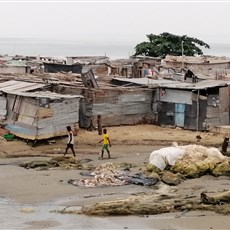
Leaving Barra do Dande
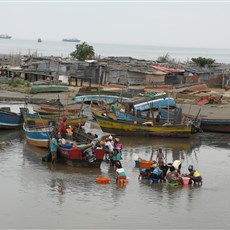
Leaving Barra do Dande
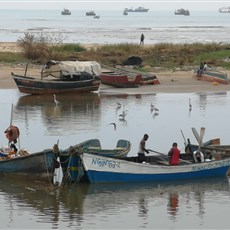
Leaving Barra do Dande
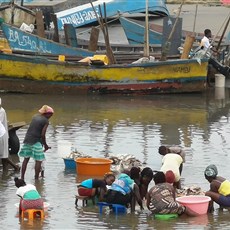
Leaving Barra do Dande
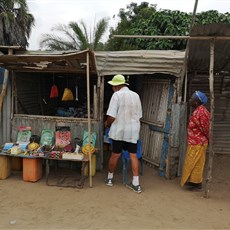
Leaving Barra do Dande
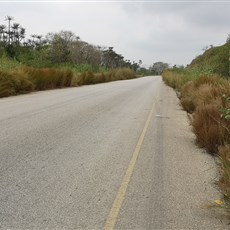
Barra do Dande to petrol station
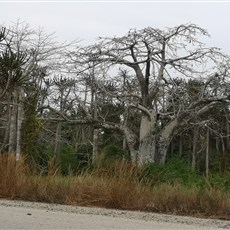
Barra do Dande to petrol station
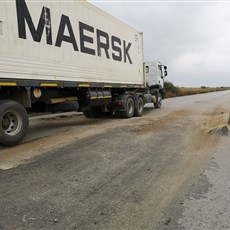
Barra do Dande to petrol station
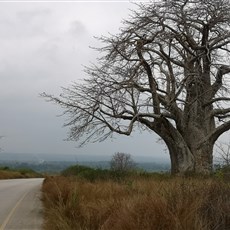
Barra do Dande to petrol station
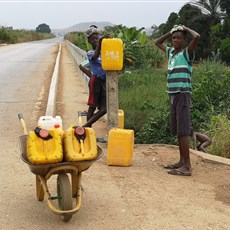
Barra do Dande to petrol station - collecting water
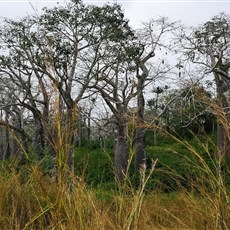
Barra do Dande to petrol station
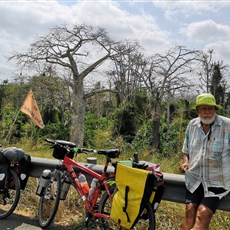
Barra do Dande to petrol station - apple break
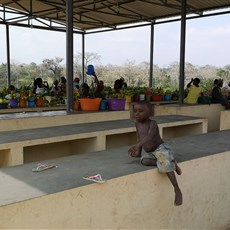
Barra do Dande to petrol station
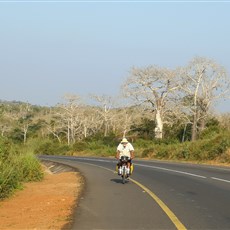
Barra do Dande to petrol station
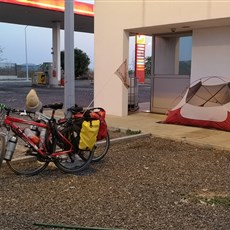
Camping at petrol station